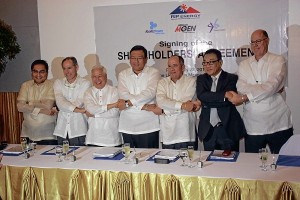
ENERGY SECRETARY Jose Rene Almendras (center) holds hands with Erramon Aboitiz (right), president of RP Energy, and Oscar Reyes (left), Meralco president and CEO, at the signing of a deal that transferred controlling stake in RP Energy to Meralco in July 2011. RP Energy is building a 600-megawatt coal-fired power plant in Subic Bay Freeport, which faces strong opposition. ROBERT GONZAGA/INQUIRER CENTRAL LUZON
SUBIC BAY FREEPORT—A top official of the Subic Bay Metropolitan Authority (SBMA) said a consortium of energy firms planning to put up a 600-megawatt coal-fired power plant here would not be able to avail itself of the tax incentives of the free port zone because it would sell the power it generates outside the zone.
SBMA Chair Roberto Garcia said RP Energy Inc., a consortium of energy companies owned by Aboitiz Power, Manila Electric Co. (Meralco) and Taiwan Cogen Corp., was applying with the Board of Investments (BOI) for incentives.
“Under the SBMA rules, since 100 percent of production is going to be consumed in the customs territory (outside of the Subic freeport), they must apply with BOI [for them to get a tax exemption],” Garcia said.
He said the law was clear. “[The power that RP Energy’s coal plant is going to produce] is going to the domestic market, so we really cannot give them a certificate of tax exemption,” he said.
Because of this, he said RP Energy must pay regular taxes, which would amount to 30 percent of gross earnings minus expenses, under the rules of the Bureau of Internal Revenue.
Garcia said RP Energy was seeking tax holidays from BOI and exemption of taxes in the importation of equipment.
Aaron Domingo, general manager of Meralco PowerGen, told reporters earlier that his firm was studying whether to pay taxes because the proposed coal-fired power plant would supply the national grid and not Subic locators.
He said RP Energy had a valid lease contract with the SBMA.
But Garcia described RP Energy’s contract as “highly disadvantageous.”
In an earlier interview, he said: “Everybody that I talked to, when I tell them RP Energy will only be paying P1 million to SBMA every year, [they react by saying] ‘that’s outrageous.’”
“RP Energy cannot hold me to that contract. I will not allow it,” he added.
Garcia said while RP Energy has a certificate of registration and tax exemption, this was issued under the “old system.”
“[We’ve put in place a new system wherein companies applying for free port incentives] must have a certificate of tax exemption, but if your product is for domestic consumption then you can only have certificate of registration and business permit,” he said.
In a report that the SBMA submitted to Malacañang, the agency said the project was rejected by free port stakeholders in a social acceptability process held last year.
At least 155 representatives of the free port’s surrounding local governments, the zone’s business and tourism locators, free port residents, landowners that included Aetas, and free port workers took part in the consultation process from
Dec. 7 to 9.
RP Energy representatives, however, did not join the consultations. Robert Gonzaga, Inquirer Central Luzon